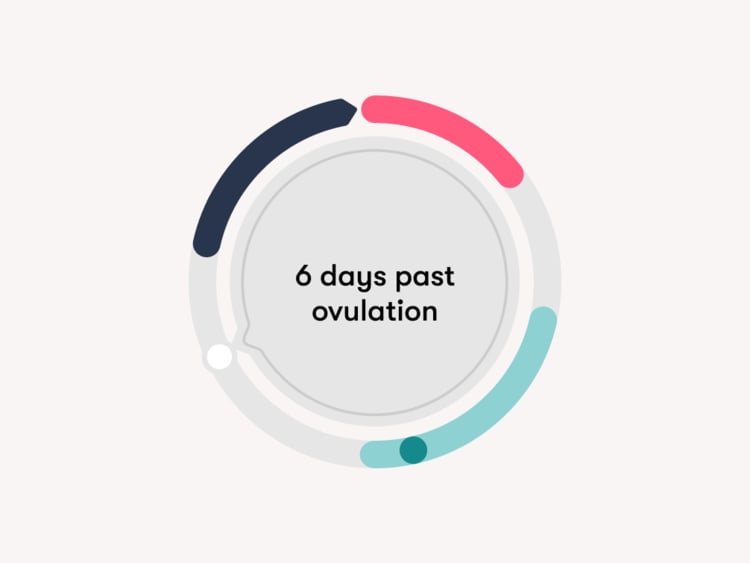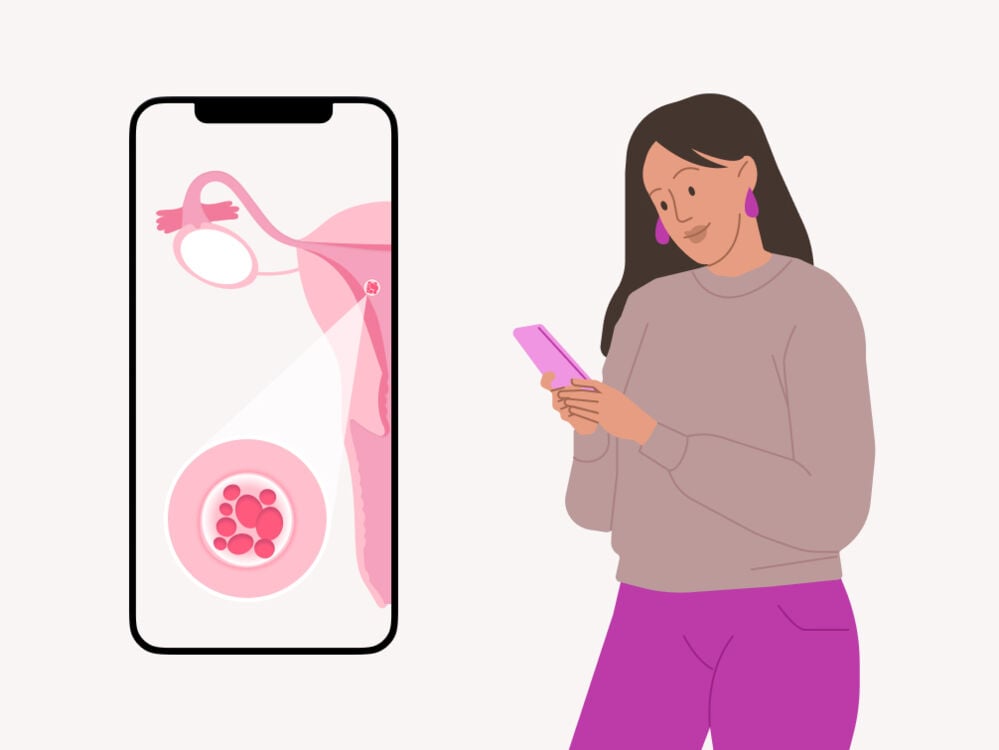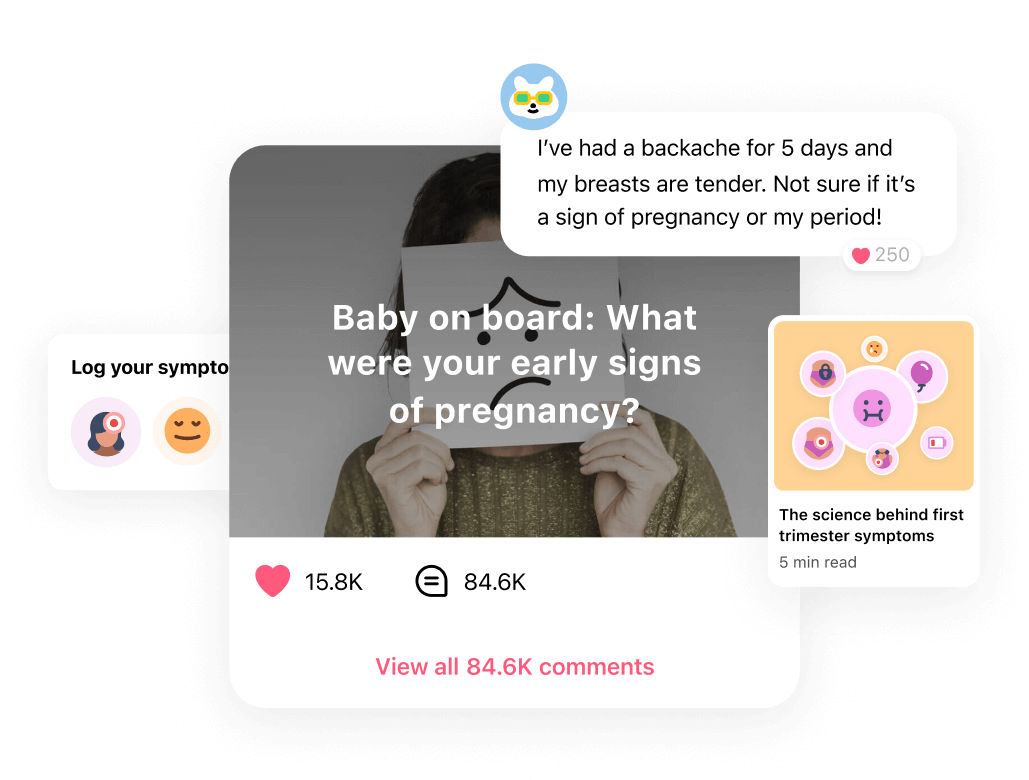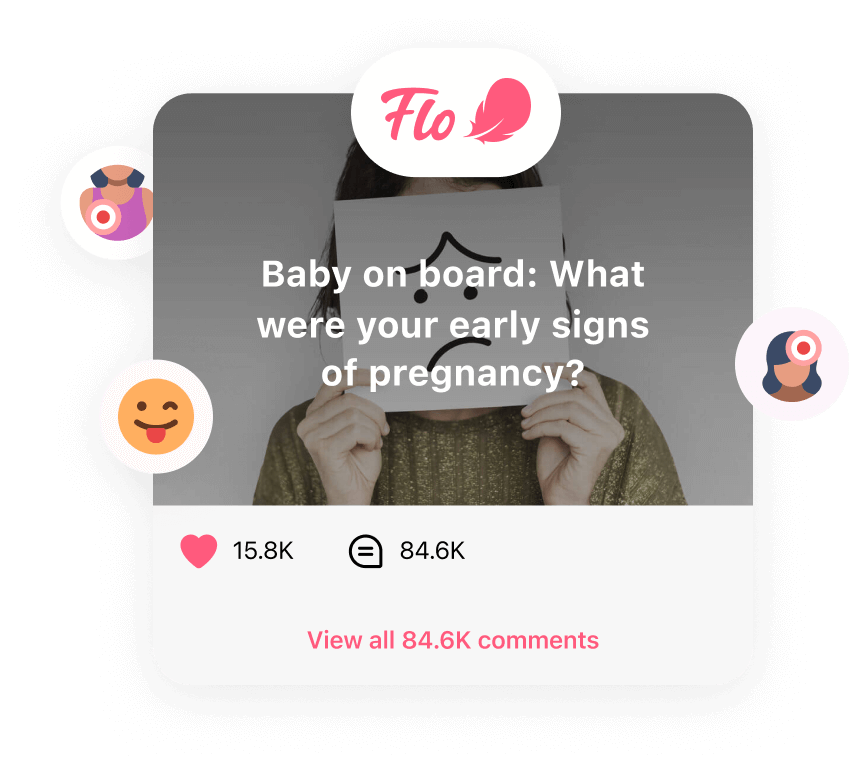Are you wondering when you can take a pregnancy test? Here’s the lowdown on 6 DPO.
-
Tracking cycle
-
Getting pregnant
-
Pregnancy
-
Help Center
-
Flo for Partners
-
Anonymous Mode
-
Flo app reviews
-
Flo Premium New
-
Secret Chats New
-
Symptom Checker New
-
Your cycle
-
Health 360°
-
Getting pregnant
-
Pregnancy
-
Being a mom
-
LGBTQ+
-
Quizzes
-
Ovulation calculator
-
hCG calculator
-
Pregnancy test calculator
-
Menstrual cycle calculator
-
Period calculator
-
Implantation calculator
-
Pregnancy weeks to months calculator
-
Pregnancy due date calculator
-
IVF and FET due date calculator
-
Due date calculator by ultrasound
-
Medical Affairs
-
Science & Research
-
Pass It On Project New
-
Privacy Portal
-
Press Center
-
Flo Accuracy
-
Careers
-
Contact Us
6 DPO: Are there any pregnancy symptoms at six days past ovulation?


Every piece of content at Flo Health adheres to the highest editorial standards for language, style, and medical accuracy. To learn what we do to deliver the best health and lifestyle insights to you, check out our content review principles.
When you’re trying to conceive, it can be tough not to be on high alert for every new feeling or twinge. Nausea, bloating, and feeling super tired are all listed as potential pregnancy symptoms but could also be a sign that your period is on the way. Confusing, right? If you start to notice some of these symptoms, you might wonder when you can take a pregnancy test and if 6 DPO (days past ovulation) is too early to know if you’re pregnant.
Here’s a closer look at what’s happening in your body at 6 DPO, including potential symptoms you might experience and the best time to take a test to get an accurate result.
*What you might call 6 days pregnant is actually 6 days past ovulation (DPO). Ovulation is around the midpoint in your cycle where one of your ovaries releases an egg. Doctors date pregnancy from the first day of your last menstrual period, which happens about two weeks before ovulation. So when you’re 6 DPO, medically, that puts you at roughly 2 weeks and 6 days pregnant.
6 DPO symptoms if you’re pregnant
Implantation might have only just happened at 6 DPO, but you might notice that you feel slightly different. The truth is that thanks to hormone fluctuations that are common in early pregnancy and just before your period (premenstrual symptoms, we’re looking at you), it can be tricky to work out exactly what’s going on right now. Premenstrual syndrome (PMS) is a term that describes the different symptoms you might feel ahead of your period starting.
Take a quiz
Find out what you can do with our Health Assistant
Unfortunately, until you can take a pregnancy test after the first day of your missed period, you won’t know for sure. And 6 DPO is still early to notice any pregnancy symptoms. However, due to changes in your hormone levels, both just before your period and in early pregnancy, some people do experience some symptoms, including:
- Cramping
- Nausea
- Food cravings
- Breast pain or tenderness
- Fatigue or feeling more tired than usual
Let’s dig into these symptoms more.
Cramping
You’ve likely experienced some abdominal cramping just before your period has started. It’s a pretty common PMS symptom, after all. During your cycle, the lining of your uterus releases hormone-like substances called prostaglandins. These aid in ovulation and your period. They can also cause your uterus to contract and you to feel cramps.
But did you know that some people experience cramping around the time of implantation, too? These cramps can feel similar to menstrual cramps and are sometimes accompanied by light implantation bleeding. It’s really important to note that there’s little scientific evidence to suggest that cramping is a sign of implantation. However, some people say they feel it. This causes the uterus to contract, resulting in back pain and cramping. And as 6 DPO lines up pretty neatly with when you might start to experience premenstrual cramping, it can be tricky to know the difference between the two.
Nausea
You might have experienced some nausea around the time of your period. It can be caused by — you guessed it — changes in your hormone levels. However, nausea is also a well-known early sign of pregnancy.
Food cravings
Have you found yourself reaching for some pretty whacky food combinations at 6 DPO? This could be because your hormones fluctuate during the luteal phase of your cycle (before your period), and your estrogen levels in particular can be linked to your appetite. Estrogen has been found to inhibit appetite. So it follows that when levels of this hormone are low, you might feel hungrier.
Food cravings also have strong links to pregnancy. You’ll likely have heard pregnant friends describe the details of their more unusual snacks. Again, this is caused by changes in your hormone levels.
Breast pain
Breast pain and tenderness could signal that your period is on the way and can be linked to changes in your hormone levels. This is called cyclical breast pain. However, if your boobs feel swollen and tender, this is a common early pregnancy symptom and could be related to hormone fluctuations.

Fatigue
While we often take it for granted as just something that happens every month, your body goes through some pretty big changes during your cycle. As your progesterone levels rise during your luteal phase, an afternoon nap might become more appealing. However, fatigue is also common in early pregnancy as your progesterone levels rise then too.
6 DPO: What to expect
To help you understand what might be going on at 6 DPO, it can be helpful to place it into the context of your cycle.
Your menstrual cycle can be split into two stages:
- The follicular phase: Everyone’s cycle is slightly different. A normal menstrual cycle is considered to be between 21 and 35 days long, and a new cycle always starts on the first day of your period. This first stage of your cycle is called your follicular phase. If you have a 28-day cycle, your follicular phase typically lasts 14 days. During this time, your estrogen levels rise, and the lining of your uterus thickens in preparation for ovulation.
- The luteal phase: Between days 14 and the end of your cycle, you enter the luteal phase. It starts after ovulation, which is when one of your ovaries releases an egg.“
The luteal phase is the stage of the menstrual cycle from ovulation to your next period,” says Dr. Sara Twogood, obstetrician and gynecologist, Cedars-Sinai Medical Group, California, US. During this time, your progesterone levels rise in preparation for pregnancy. If your egg is fertilized by a sperm and then implants into your uterine lining, then you’re considered to be pregnant.
Six DPO can be seen as a pretty crucial time in your luteal phase. Why? Well, it generally takes around six to 10 days after ovulation for your egg to potentially be fertilized by a sperm, to travel down your uterine tubes, and to implant into your uterine lining, signaling the official start of your pregnancy. This means at 6 DPO, implantation might have just happened — or might be about to happen.
Once implantation happens, it triggers your body to start producing hCG, the pregnancy hormone that at-home pregnancy tests detect in your urine. In the first eight to 10 weeks of pregnancy, your hCG levels rapidly increase. In some cases, they can almost double every three days, but this isn’t the same for everyone. HCG has an important job because it helps to thicken the lining of your uterus and supports your pregnancy as your baby starts to develop.
6 DPO discharge: What’s normal?
As your hormones fluctuate, your discharge changes throughout your cycle. Around ovulation, your discharge might look and feel a little bit like egg whites, aka clear and slippery, resembling raw egg whites. After you’ve ovulated (aka 6 DPO), your discharge might be white, dry, or sticky. However, we’re all different, and discharge after ovulation can vary from person to person.
If you want to keep an eye on changes in your vaginal discharge and better understand your body’s “baseline” and patterns, it can help to log them in a period-tracking app like Flo.

 Over
7.8M
ratings averaging
4.8/5
*
Over
7.8M
ratings averaging
4.8/5
*
Understand your body’s signals with the Flo app
- Chat with others who are trying to get pregnant.
- Get trusted information on signs of pregnancy from 100+ medical experts.
- Log your symptoms and learn what they could be trying to tell you.
 Over
7.8M
ratings averaging
4.8/5
*
Over
7.8M
ratings averaging
4.8/5
*

Trying to conceive?
The Flo app can help you through the two-week wait.

 Over
7.8M
ratings averaging
4.8/5
*
Over
7.8M
ratings averaging
4.8/5
*
Understand your body’s signals with the Flo app
- Chat with others who are trying to get pregnant.
- Get trusted information on signs of pregnancy from 100+ medical experts.
- Log your symptoms and learn what they could be trying to tell you.
Can I take a pregnancy test at 6 DPO, or is it too early?
If your body has started to produce hCG at 6 DPO, you might be curious if it can be picked up by a pregnancy test at this point. While some tests promise super accurate results very early in pregnancy, 6 DPO is still a little bit too early to take a test. This can be disheartening, but it’s important to remember that the higher your levels of hCG, the easier they are to detect in your urine on a pregnancy test.
Most at-home pregnancy tests are 99% accurate, provided you use them at the right time and exactly as instructed. Experts suggest that it’s best to wait until after the first day of your missed period before taking a test.
The two-week wait between 6 DPO and the first day of your missed period might feel impossibly long. It may sound easier said than done but try to be gentle with yourself. If you find comfort in journaling or other meditative practices, make sure you give yourself the space to do so. Speak to your partner, friends, or family about how you’re feeling,o r reach out to people you know you always have fun with to take your mind off it.
Are 6 DPO symptoms a sign of a BFP?
If you’ve been trying to conceive, then you may have already heard the acronym BFP or big fat positive. Fear not if you’ve never heard of a BFP. It’s simply a fertility forum acronym that means a positive pregnancy test result. As we’ve already said, it’s still a little early to do a pregnancy test at 6 DPO. For the most accurate results, it’s best to wait until the first day of a missed period.
6 DPO and no symptoms
If you’re trying to conceive, then you may be waiting for the moment when you “feel” pregnant. This can be a really emotional time, so try to remember that everyone experiences pregnancy differently. You may not have any symptoms for a few weeks, and this is considered perfectly normal. As implantation may only have just happened, it’s typical not to feel any different at this time.
Key takeaways
- 6 DPO is generally too early for pregnancy symptoms because implantation (when the egg implants into the lining of your uterus) may only just have happened. This doesn’t necessarily mean you won’t get a positive pregnancy test this cycle though.
- After you’ve conceived, it can take a few weeks before you feel any different.
- Your body starts to produce the pregnancy hormone human chorionic gonadotropin (hCG) after your fertilized egg has implanted. This happens around six to 10 DPO, and it’s hCG that home pregnancy tests look for in your urine.
- The best time to take a pregnancy test is starting from the first day of your missed period when your levels of the pregnancy hormone hCG should be high enough to be detected in your urine.
More FAQs about being 6 days past ovulation
Has anyone got a positive at 6 DPO?
You might wonder if you can take a pregnancy test at 6 DPO just to see if any hCG can be detected in your urine. This might seem tempting, but it’s really important to allow your body enough time to produce a high-enough level of hCG so you can get an accurate result.
What are the symptoms of hCG rising?
It’s pretty much impossible to know if your hCG levels are rising before doing a pregnancy test after your missed period. However, some of the symptoms of early pregnancy you can look out for include a missed period, breast tenderness or sensitivity, nausea, needing to pee more often, and feeling more tired than usual. Many of these symptoms are caused by fluctuations in your hormones. While tracking these changes can be exciting, the only way to know for sure if you’re pregnant is by doing a test.
Can a blood test detect pregnancy 6 DPO?
There are a few different ways you can test if you’re pregnant. One method is going to your doctor’s office and having a blood test. This test works similarly to an at-home urine test in that it detects hCG in your blood. While a blood test may be able to detect pregnancy slightly earlier than an at-home test, 6 DPO is still generally considered to be too early.


Hey, I'm Anique
I started using Flo app to track my period and ovulation because we wanted to have a baby.


The Flo app helped me learn about my body and spot ovulation signs during our conception journey.


I vividly
remember the day
that we switched
Flo into
Pregnancy Mode — it was
such a special
moment.
Real stories, real results
Learn how the Flo app became an amazing cheerleader for us on our conception journey.
References
“Am I Pregnant?” Cleveland Clinic, my.clevelandclinic.org/health/articles/9709-pregnancy-am-i-pregnant. Accessed 25 Mar. 2025.
“Cervical Mucus.” Cleveland Clinic, my.clevelandclinic.org/health/body/21957-cervical-mucus. Accessed 25 Mar. 2025.
“Conception.” Cleveland Clinic, my.clevelandclinic.org/health/articles/11585-conception. Accessed 25 Mar. 2025.
“Doing a Pregnancy Test.” NHS, 13 Dec. 2024, www.nhs.uk/pregnancy/trying-for-a-baby/doing-a-pregnancy-test/.
“First Trimester Fatigue.” Johns Hopkins Medicine, 4 June 2024, www.hopkinsmedicine.org/health/conditions-and-diseases/first-trimester-fatigue.
“Follicular Phase.” Cleveland Clinic, my.clevelandclinic.org/health/body/23953-follicular-phase. Accessed 25 Mar. 2025.
Gudipally, Pratyusha R., and Gyanendra K. Sharma. “Premenstrual Syndrome.” StatPearls, StatPearls Publishing, 2025.
Hirschberg, Angelica Lindén. “Sex Hormones, Appetite and Eating Behaviour in Women.” Maturitas, vol. 71, no. 3, Elsevier BV, Mar. 2012, pp. 248–256.
“Home Pregnancy Tests: Can You Trust the Results?” Mayo Clinic, www.mayoclinic.org/healthy-lifestyle/getting-pregnant/in-depth/home-pregnancy-tests/art-20047940. Accessed 25 Mar. 2025.
“Human Chorionic Gonadotropin.” Cleveland Clinic, my.clevelandclinic.org/health/articles/22489-human-chorionic-gonadotropin. Accessed 25 Mar. 2025.
“Irregular Periods.” Cleveland Clinic, my.clevelandclinic.org/health/diseases/14633-abnormal-menstruation-periods. Accessed 25 Mar. 2025.
“Luteal Phase.” Cleveland Clinic, my.clevelandclinic.org/health/articles/24417-luteal-phase. Accessed 25 Mar. 2025.
“Menstrual Cramps.” Mayo Clinic, 30 Apr. 2022, www.mayoclinic.org/diseases-conditions/menstrual-cramps/symptoms-causes/syc-20374938.
“Ovulation.” Cleveland Clinic, my.clevelandclinic.org/health/articles/23439-ovulation. Accessed 25 Mar. 2025.
“Pregnancy Cravings and Food Aversions.” Tommys, www.tommys.org/pregnancy-information/being-pregnant/nutrition-pregnancy/cravings-food-and-drinks-pregnancy. Accessed 25 Mar. 2025.
“Pregnancy Test.” MedlinePlus, medlineplus.gov/lab-tests/pregnancy-test/. Accessed 25 Mar. 2025.
“Pregnancy Test: When To Take, Types & Accuracy.” Cleveland Clinic, my.clevelandclinic.org/health/diagnostics/9703-pregnancy-tests. Accessed 25 Mar. 2025.
“Premenstrual Syndrome (PMS).” Mayo Clinic, 25 Feb. 2022, www.mayoclinic.org/diseases-conditions/premenstrual-syndrome/symptoms-causes/syc-20376780.
“Progesterone.” Cleveland Clinic, my.clevelandclinic.org/health/body/24562-progesterone. Accessed 25 Mar. 2025.
“Prostaglandins.” Cleveland Clinic, my.clevelandclinic.org/health/articles/24411-prostaglandins. Accessed 25 Mar. 2025.
“Signs and Symptoms of Pregnancy.” NHS, 9 Dec. 2024, www.nhs.uk/pregnancy/trying-for-a-baby/signs-and-symptoms-of-pregnancy/.
Su, Ren-Wei, and Asgerally T. Fazleabas. “Implantation and Establishment of Pregnancy in Human and Nonhuman Primates.” Advances in Anatomy, Embryology, and Cell Biology, vol. 216, 2015, pp. 189–213.
“Symptoms of Pregnancy: What Happens First.” Mayo Clinic, www.mayoclinic.org/healthy-lifestyle/getting-pregnant/in-depth/symptoms-of-pregnancy/art-20043853. Accessed 25 Mar. 2025.
Thiyagarajan, Dhanalakshmi K., et al. “Physiology, Menstrual Cycle.” StatPearls, StatPearls Publishing, 2025.
“What Are Some Common Signs of Pregnancy?” National Institute of Child Health and Human Development, www.nichd.nih.gov/health/topics/pregnancy/conditioninfo/signs. Accessed 25 Mar. 2025.
History of updates
Current version (14 April 2025)
Published (12 February 2019)
In this article

Get your personal guide to fertility
-
Learn how to read your body's ovulation signals
-
Find daily conception tips from our experts
-
Chat with others who are trying to get pregnant




